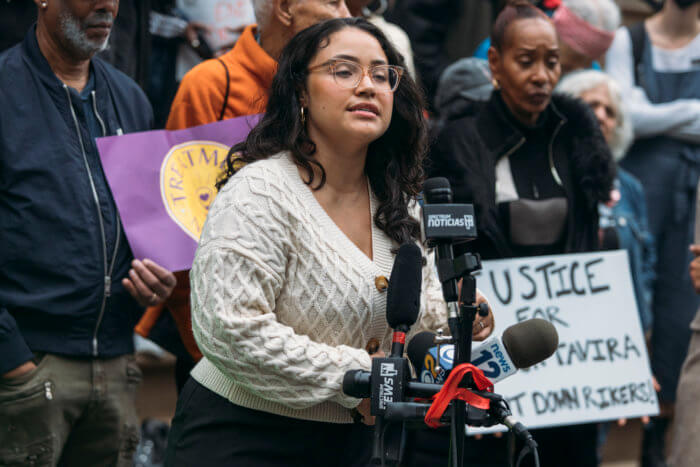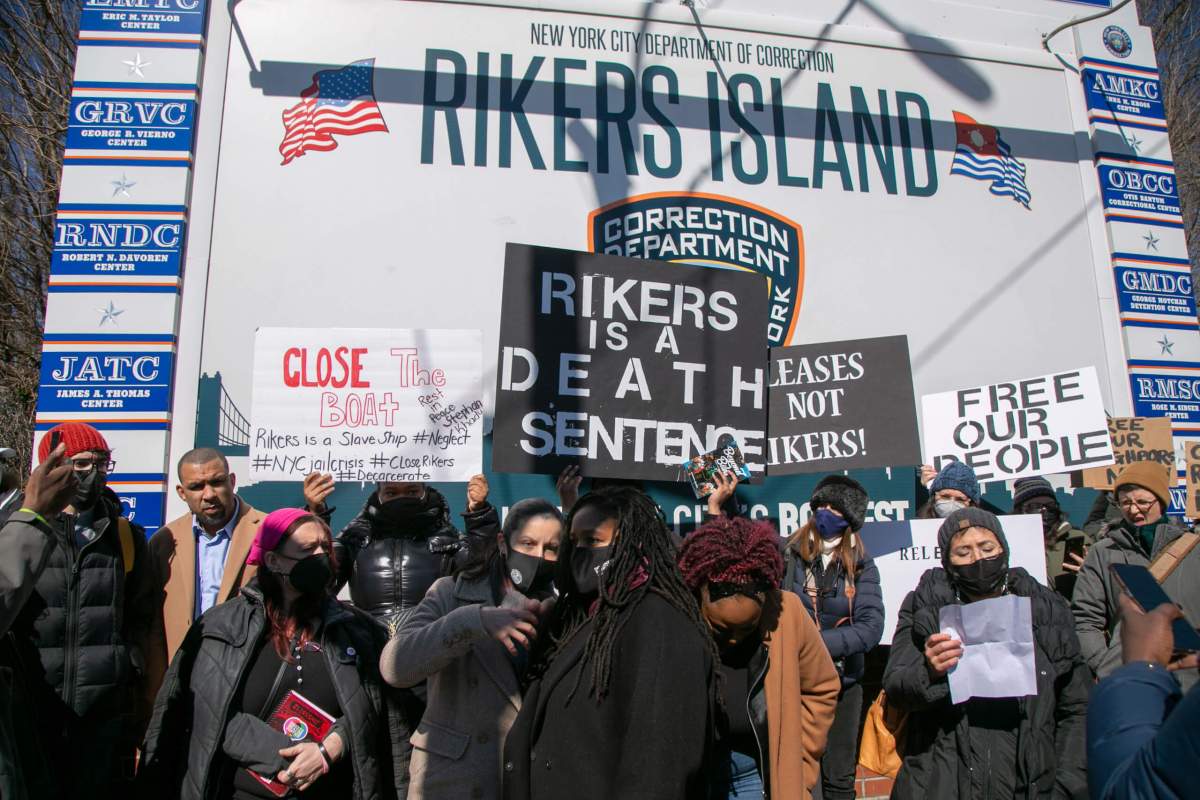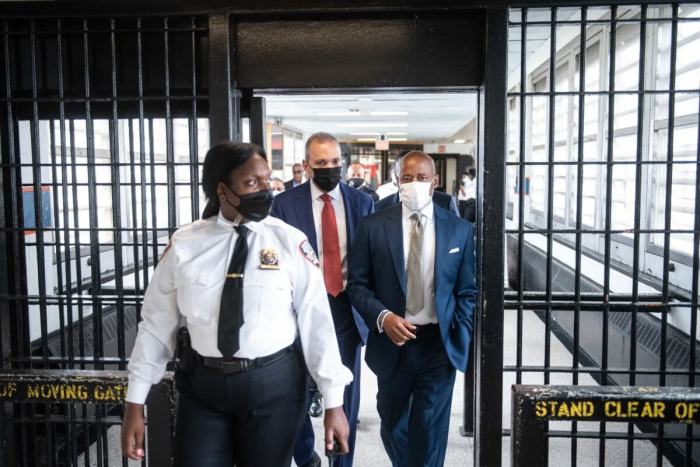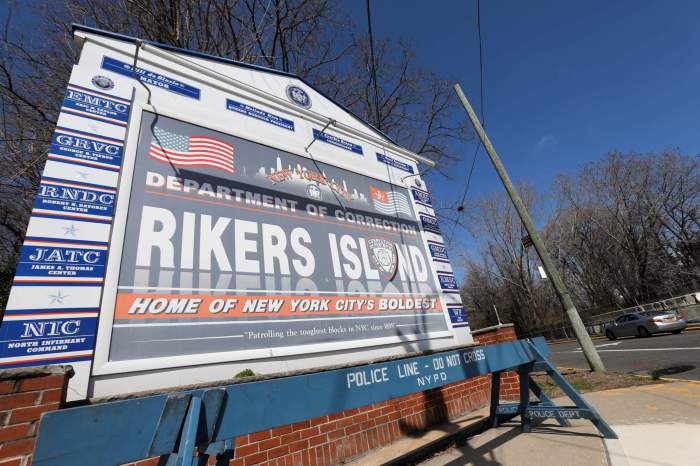The city’s Board of Corrections has formed a committee to explore the consequences of a proposal that would effectively ban people held in city jails from receiving physical mail and packages, it announced at a Jan. 10 meeting.
Three members of the board, which oversees and monitors city jails and the Department of Corrections, will “focus on the impact of the proposed variances on the incarcerated population,” said BOC chair Dwayne C. Sampson. The committee — made up of BOC members Jacqueline Sherman, Jacqueline Pitts, and Joseph Ramos — will work to address the concerns of the board and of the general public before the next BOC meeting on Feb. 14, according to Sampson.
“It will work collaboratively with department leadership to develop conditions that address both contraband entry concerns and the needs of incarcerated individuals to maintain connections to their family and community,” Sampson continued.
Breaking down the variances — and the opposition
Late last year, the Department of Corrections requested variances — or changes to — existing rules regarding the receipt of mail and packages. Claiming letters often contain drugs like fentanyl, the DOC wants all mail to be sent to a third-party facility, where it would be opened and scanned. Digital copies of letters, drawings, and other mail would then be sent to the recipient on a tablet provided by the jail.
A second variance requested at the same time would require that all packages be mailed by the store or retailer they were purchased at — not by a friend or family member. If a family member wanted to send books purchased at Barnes and Noble, for example, they’d have to have staff at the store itself package and ship the books themselves.
Hundreds of people have overdosed on drugs in city jails since January 2021, NY1 reported last year, and nine people have died.

The average daily population of New York City’s jail system was about 5,700 in the first quarter of Fiscal Year 2023, according to DOC data. About 22% of those held in jail were arraigned in Brooklyn, and most are being held in various facilities on Rikers Island – jails across the boroughs have closed as part of former mayor Bill de Blasio’s plan to permanently close Rikers Island and replace it with four smaller borough-based jails. Demolition and construction of new facilities is underway.
Nineteen people died on Rikers Island in 2022 — most by suicide. A federal monitor appointed to supervise conditions on Rikers in October reported that the jail is “dangerously unsafe,” noting that fights between people in custody and violent use of force by DOC officers is common. Persistent staff shortages have exacerbated issues. As of Nov. 2022, slashings and stabbings were down in city jails compared to Jan. 2022, according to DOC data, but detainee fights and use of force were higher.
The mail variance requests have raised alarm bells for incarcerated people, their loved ones, lawyers, and elected officials, who worry about the impact they would have on incarcerated people. Prior to the Jan. 10 meeting, Brooklyn Defender Services penned a letter to the BOC expressing their opposition to the variances.
Signed by S. Lucas Marquez, the Associate Director of BDS’ Civil Rights & Law Reform division, the letter says the variances could cut off communication between incarcerated people and their families and loved ones and negatively impact the mental and emotional health of people in jail.
People often hang physical letters and drawings on the walls of their cells, Marquez wrote, something that could not be done with digital mail. Scanned letters are often blurry and unreadable, she said, and require tablets to be read — but tablets are not yet available in city jails, and if they break or are confiscated, recipients would not be able to access their mail.
“While we are disappointed that the Board did not outright deny this variance, we believe that if the committee listens to incarcerated people and their loved ones and researches the effects of these policies, they will come to the logical conclusion that this proposal is harmful and must be denied,” Marquez said in a statement. “Across the country, similar mail-scanning policies have failed to reduce drug use and overdoses, while further alienating people from their loved ones.”
Additionally, Marquez added, though DOC claims mail and packages are a significant source of drugs in city jails, there’s little evidence beyond anecdotes to back up the claim — but plenty of evidence that corrections officers and other DOC employees regularly smuggle drugs into the facilities.

During the Jan. 10 meeting, BOC board member Robert Cohen asked DOC Commissioner Louis A. Molina if the department has considered screening employees for drugs as they enter facilities, citing statistics that DOC employees and officers are responsible for bringing most drugs into city jails.
“I just want to correct the categorization of the majority of stuff coming in … over the last six years, we have unfortunately had 25 correction officers, uniformed staff, that were arrested for bringing in contraband,” Molina said. “But that’s since 2017, and 25 is not a majority of the thousands of people that work at the Department of Corrections. We [intercepted] more than 532 contraband narcotics items coming in through the mail. Of that 530 or so items, 153 were directly connected to having fentanyl. There are a number of what I would call streams of possibilities where narcotics can come into our facilities … I do not believe that the majority of contraband narcotics coming into our facilities is a uniformed or non-uniformed contractor or volunteer problem. A lot of this stuff is coming in through the mail as well.”
Elected officials step in
The day before the hearing, Brooklyn Councilmember Crystal Hudson partnered with Bronx rep Carlina Rivera to send a letter opposing the variances to the BOC. The missive was signed by 16 other councilmembers — including Brooklyn reps Lincoln Restler, Jennifer Gutiérrez, Alexa Avilés, Shahana Hanif, and Rita Joseph.
“The proposed variances do nothing to address the issues the Board of Correction is seeking to remedy,” Hudson said in a statement. “Rather than addressing the rot in their ranks, the Board is debating changes to strip incarcerated New Yorkers of their rights and open the door for private enterprise to take advantage of those who are incarcerated and their loved ones.”
Hudson also plans to introduce a council resolution opposing the variances at the City Council Stated Meeting on Jan. 16.

Hudson isn’t the only pol to take issue with the role of a private company in the plan. In a Jan. 6 letter opposing the variances, City Comptroller Brad Lander reminded DOC that Securus Technologies, the company providing the tablets, which DOC has worked with in the past, has allegedly illegally recorded phone calls between people in detention and their lawyers. Scanned written correspondence is even more likely to be read and shared, Lander said.
The comptroller also accused DOC of keeping the contracting process between DOC and Secarus secret, and not sharing potential costs with stakeholders.
“These changes would likely come with costs to the city, for the people in custody using tablet services, and for loved ones on the outside sending packages,” Lander said. “Currently, however, neither my office nor the Board knows that those costs would be, since we have not been provided with that information.”
A DOC spox said drug contraband being smuggled into jails spiked during the pandemic, when in-person visits were suspended. An increase in Tactical Search Operations has helped recover more drugs and weapons in jails, according to the department.
“Keeping our staff and individuals in our custody safe is paramount, and one of the key ways we can do that is by eradicating contraband in our jails,” the spokesperson said. “We have zero tolerance for anyone smuggling contraband into our facilities, and that includes our staff, contracted providers, and visitors. Scanning mail onto tablets will not only keep drugs out of our jails, but will also likely increase the efficiency of mail processing.”























